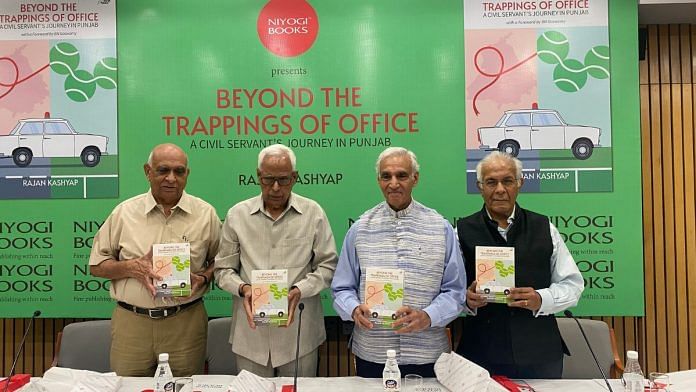When civil servants write their memoirs, the retired officers turn up in droves for the book launch. Retired IAS officer of Punjab cadre Rajan Kashyap’s new book was no different. It was by the civil servants for the civil servants and of the civil servants. And the one takeaway from all the talk was how to be a good civil servant.
The hall was a sea of grey hair at the India International Centre. In his book titled Beyond the Trappings of Office — A Civil Servant’s Journey in Punjab, Kashyap details the exciting adventures, from working under the Emergency, Operation Blue Star, and the Green revolution that shaped modern India.
“A selfless service requires ethical commitment and no transactions under the table. I am very honored to be here because I am honoring the person who deserves the highest praise for his ethical commitment,” retired IAS officer and former Delhi L-G Tejendra Khanna said, sharing anecdotes from Kashap’s book and life.
Also read: ‘Narasimha Rao was first BJP PM, doing puja when Babri Masjid fell’—Mani Shankar Aiyar
The gathering was full of seasoned bureaucrats of yesteryears such as former IAS N.N. Vohra, who was also the 12th Governor of Jammu and Kashmir, and Wajahat Habibullah, former chairperson of the National Commission for Minorities who served as India’s first Chief Information Commissioner.
It almost seemed as if the programme had a predefined script, where out of the syllabus questions were not to be entertained. The anchor moderating the event hand-picked the guests and asked them a question. Funny enough, nobody answered, including Vohra and Habibullah. Questions ranged from Kashmir and RTI Act, to data protection law among others.
“This is not the right place and we don’t have enough time to talk about this,” said Vohra, when asked to comment on the Kashmir situation.
Vohra, who said he was a little disappointed with the book, spoke at length on governance, bureaucracy, and the Constitution but nothing about the book. “When things go wrong, we blame the bureaucrats but blaming the bureaucracy is not fair,” he said. “We have achieved good results after the British left us”.
The audience had to wait for Tejendra Khanna to come to the podium and talk about the book and the writer himself as they both shared a good friendship.
In a gathering full of former bureaucrats, Khanna shared advice for serving and future officers on how to be a good bureaucrat: “A great trade about Kashyap is that he never asks for a posting — when you ask, you oblige.”
“Go to the spot, talk to the people. Then only you will get a better sense of the problem,” said Khanna, citing a situation in which people were protesting after soldiers had died in an attack and Kashyap had to climb atop a bus to pacify them.
Also read: There’s a search for lesser known freedom fighters in India. New novel jumps in with Santhals
But it was Habibullah who had come most prepared with sticky notes and stickers in the copy of the book. He shared how difficult it was to be a bureaucrat as getting admission his son into the school for kids was not easy.
“There was a renowned school near my house where getting admission was really difficult, I told my father to talk to the school as he was friendly with some of them, but they told him that there is so much rush and that it would be difficult. But when my father told the school management that I am posted in the PM’s office, the teacher agreed and said-send them tomorrow,” Habibullah recalled.
“We were sitting in the room and a lady came saying where is the Prime Minister’s office boy,” said Habibullah as the hall filled with laughter.
“Some people would like to see what happens behind the curtains of bureaucracy, outsiders would like to know how bureaucrats and politicians behave, children would like it if it is closer to fiction and something more interesting,” said Khanna about the book.
“If the younger generation starts reading the book and keeps reading it without getting bored then I would think that the communication is successful,” said Kashyap in an audience that barely had four young people including this reporter.
(Edited by Anurag Chaubey)



